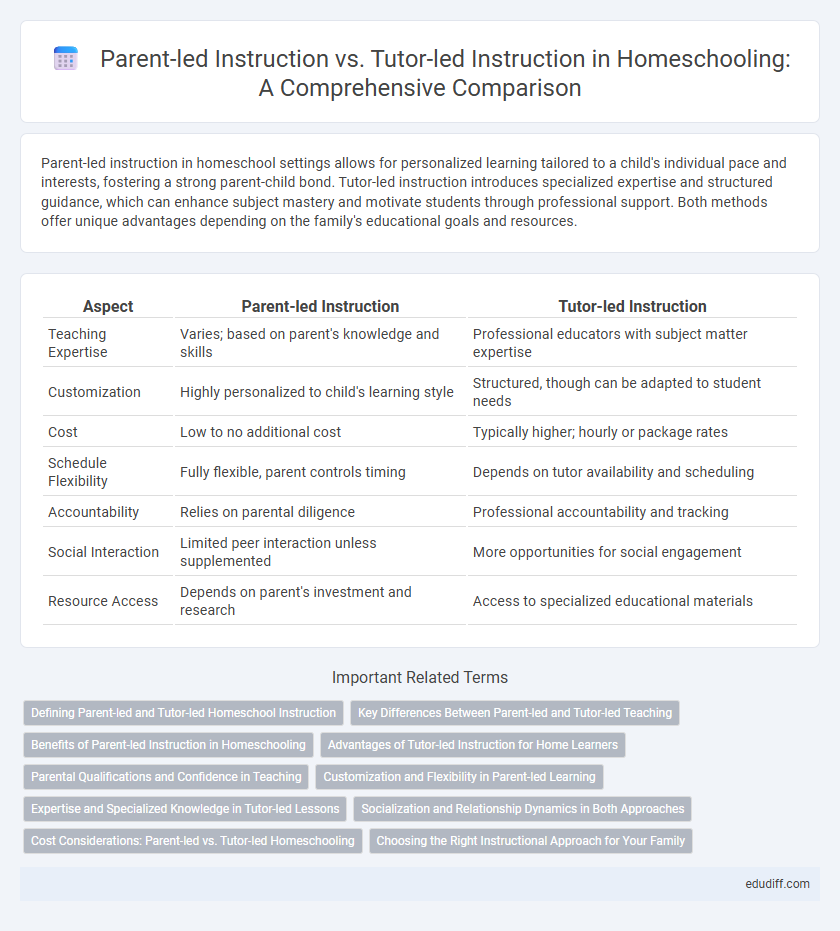Parent-led instruction in homeschool settings allows for personalized learning tailored to a child's individual pace and interests, fostering a strong parent-child bond. Tutor-led instruction introduces specialized expertise and structured guidance, which can enhance subject mastery and motivate students through professional support. Both methods offer unique advantages depending on the family's educational goals and resources.
Table of Comparison
| Aspect | Parent-led Instruction | Tutor-led Instruction |
|---|---|---|
| Teaching Expertise | Varies; based on parent's knowledge and skills | Professional educators with subject matter expertise |
| Customization | Highly personalized to child's learning style | Structured, though can be adapted to student needs |
| Cost | Low to no additional cost | Typically higher; hourly or package rates |
| Schedule Flexibility | Fully flexible, parent controls timing | Depends on tutor availability and scheduling |
| Accountability | Relies on parental diligence | Professional accountability and tracking |
| Social Interaction | Limited peer interaction unless supplemented | More opportunities for social engagement |
| Resource Access | Depends on parent's investment and research | Access to specialized educational materials |
Defining Parent-led and Tutor-led Homeschool Instruction
Parent-led homeschool instruction involves a parent directly teaching their child using a tailored curriculum and personalized scheduling, fostering a close family learning environment. Tutor-led homeschool instruction engages an external expert or professional tutor who delivers specialized lessons, often providing subject-specific expertise and structured guidance. Both approaches offer distinct advantages in customization and educational support based on family preferences and student needs.
Key Differences Between Parent-led and Tutor-led Teaching
Parent-led instruction in homeschooling fosters personalized learning environments tailored to a child's unique needs, emphasizing emotional bonding and flexible scheduling, while tutor-led instruction provides specialized subject expertise and structured lesson plans that align with standardized curricula. Parent-led teaching often adapts to the family's values and pace, promoting holistic development, whereas tutor-led methods prioritize academic rigor and targeted skill acquisition through professional guidance. Both approaches differ fundamentally in their roles, with parents acting as primary educators and tutors serving as external experts to supplement or enhance specific learning areas.
Benefits of Parent-led Instruction in Homeschooling
Parent-led instruction in homeschooling fosters individualized learning tailored to a child's unique pace and interests, enhancing engagement and comprehension. This approach strengthens family bonds through shared educational experiences and allows for flexible scheduling that adapts to the family's lifestyle. Parents can seamlessly integrate values and real-life skills into the curriculum, creating a holistic and personalized educational environment.
Advantages of Tutor-led Instruction for Home Learners
Tutor-led instruction offers specialized expertise and tailored curriculum that addresses individual learning styles, enhancing comprehension and retention for home learners. Access to a qualified tutor provides consistent feedback and structured guidance, promoting academic discipline and motivation. This personalized approach often leads to improved academic performance compared to parent-led instruction, leveraging professional teaching strategies and resources.
Parental Qualifications and Confidence in Teaching
Parental qualifications in homeschool settings often vary widely, with many parents possessing diverse educational backgrounds yet demonstrating high confidence in teaching core subjects due to personalized curriculum development. Tutor-led instruction provides structured expertise with certified educators, ensuring subject-specific knowledge and pedagogical skills tailored to the student's needs. Confidence in parental teaching correlates positively with access to homeschool resources and training, while tutor-led models benefit from formal qualifications that enhance instructional quality.
Customization and Flexibility in Parent-led Learning
Parent-led instruction offers unparalleled customization, allowing parents to tailor lessons to their child's unique learning style, pace, and interests, fostering deeper engagement and retention. Flexibility in scheduling enables families to adapt curriculum timing to fit their daily routines and extracurricular commitments, enhancing consistency and reducing stress. This personalized approach contrasts with tutor-led instruction, which often follows a standardized curriculum and fixed timetable.
Expertise and Specialized Knowledge in Tutor-led Lessons
Tutor-led instruction offers specialized knowledge across subjects, ensuring that students access expert guidance tailored to their learning needs. Parents, while dedicated, may lack the depth of expertise in certain academic areas, potentially limiting the breadth of curriculum coverage. Access to tutors with professional backgrounds enhances the quality and accuracy of instruction, promoting advanced understanding and skill development.
Socialization and Relationship Dynamics in Both Approaches
Parent-led instruction in homeschooling fosters close-knit family bonds, allowing for customized social interactions within a familiar environment, which supports emotional security and personalized social development. Tutor-led instruction provides opportunities for broader socialization through exposure to diverse teaching styles and peer interaction, helping children develop adaptability and varied communication skills. Both approaches uniquely shape relationship dynamics, with parent-led learning emphasizing trust and individualized attention, while tutor-led instruction encourages external guidance and social integration.
Cost Considerations: Parent-led vs. Tutor-led Homeschooling
Parent-led homeschooling typically incurs lower costs as parents utilize free or low-cost resources, avoiding monthly tutoring fees or private instructor salaries. Tutor-led instruction often requires a significant financial investment, including hourly rates for specialized tutors that can exceed $30-$50 per hour depending on subject expertise and location. Families must evaluate budget constraints alongside educational goals to determine the most cost-efficient and effective homeschooling structure.
Choosing the Right Instructional Approach for Your Family
Parent-led instruction in homeschooling allows for personalized, flexible teaching tailored to a child's individual learning style and pace, fostering a strong family bond and continuous parental involvement. Tutor-led instruction offers specialized expertise and structured curriculum delivery, which can enhance understanding in challenging subjects and provide professional guidance. Selecting the optimal instructional approach depends on factors such as parental availability, subject complexity, the child's learning preferences, and desired academic outcomes.
Parent-led Instruction vs Tutor-led Instruction Infographic

 edudiff.com
edudiff.com